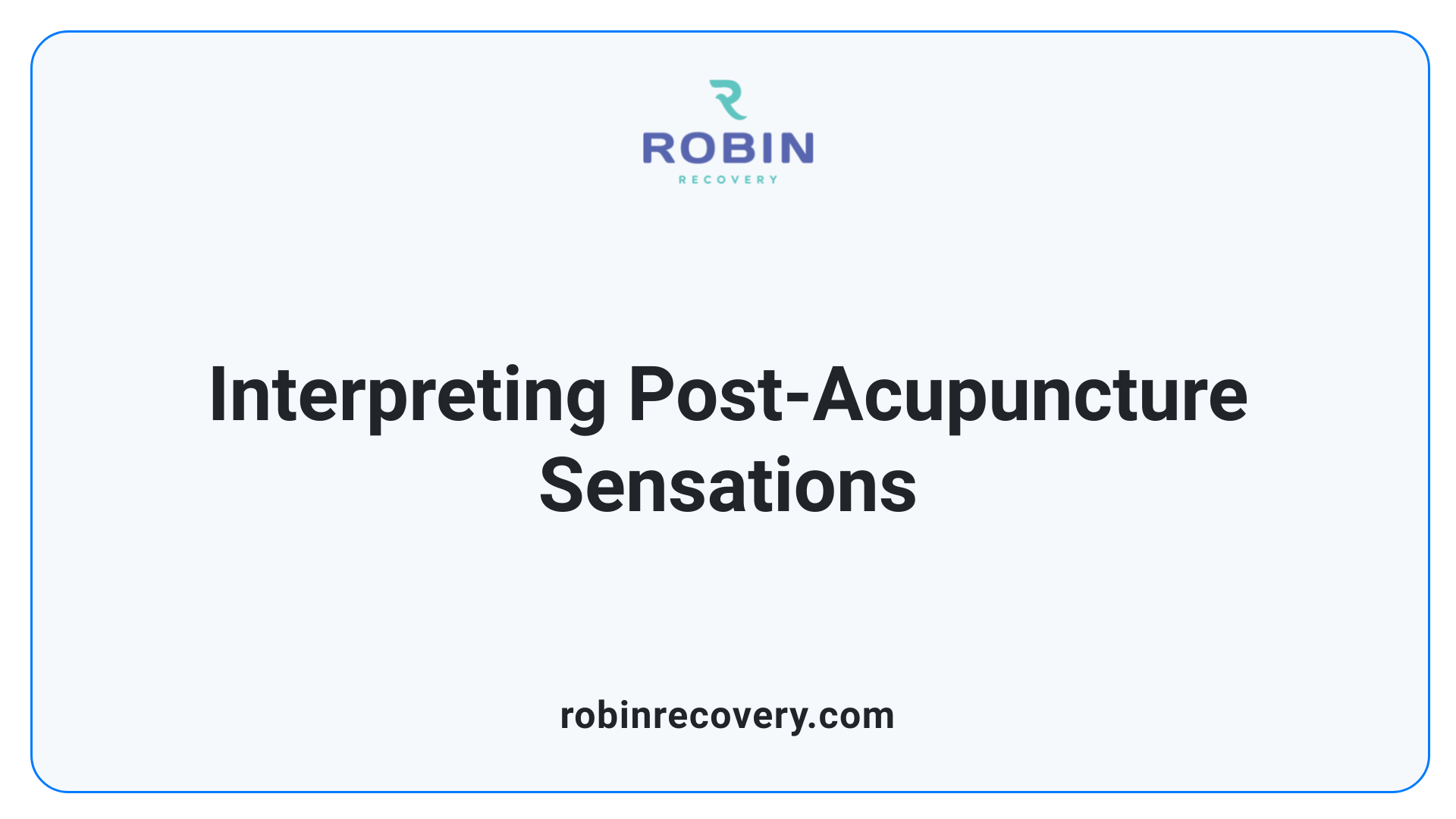Acupuncture and Recovery

Understanding Acupuncture's Role in Recovery
Acupuncture, an ancient practice rooted in Traditional Chinese Medicine, has gained traction in contemporary healthcare due to its demonstrated benefits in recovery across a spectrum of health conditions. From aiding athletic performance to assisting in postoperative care, acupuncture's role in promoting healing and well-being is increasingly recognized. This article explores how acupuncture aids in recovery, how it accelerates the healing process, what one might experience post-treatment, and the intriguing sensations that may follow.
Harnessing Acupuncture for Recovery Across Conditions

Does acupuncture help with recovery?
Acupuncture can be effective in promoting recovery from various conditions by stimulating specific points in the body to restore balance and enhance natural healing. Scientific studies back its effectiveness for treating chronic pain, sports injuries, and even symptoms related to neuropathy.
Applications for injuries, sports-related issues, and neuropathy
Acupuncture is particularly beneficial for individuals recovering from injuries like sprains and strains. It aids in pain relief by triggering the release of endorphins, which reduce discomfort significantly. Athletes use acupuncture not only for recovery from injuries but also to enhance routine recovery from intense workouts, helping to reduce muscle soreness and improve overall performance.
For those dealing with neuropathy, acupuncture may alleviate symptoms such as nerve pain, numbness, and tingling through the restoration of normal energy flow and blood circulation. More than just a remedy for the body, acupuncture encourages holistic healing, making it a valuable addition to conventional treatments.
Benefits for mental health
Beyond physical recovery, acupuncture also plays a vital role in enhancing mental health. By minimizing stress, anxiety, and depressive symptoms, acupuncture helps to create a positive mental state that supports recovery from both physical and emotional challenges. This multifaceted approach underscores acupuncture's potential as a safe, non-invasive alternative to pharmaceuticals, allowing individuals to better manage their health and recovery journeys.
Acupuncture serves as a powerful tool, promoting not only physical healing but also emotional well-being, making it a versatile option for a range of recovery needs.
The Science Behind Acupuncture's Healing Acceleration

How does acupuncture speed up healing?
Acupuncture speeds up healing by stimulating the central nervous system, which in turn releases various natural chemicals that enhance the body’s healing processes. This traditional method is rooted in Chinese medicine, where practitioners believe that acupuncture balances the body's vital energy, known as qi. By inserting thin needles at specific points, energy pathways, or meridians, are unblocked, promoting overall well-being for physical and emotional health.
Mechanisms of action in traditional Chinese medicine
Acupuncture influences neurological and physiological functions through several mechanisms:
- Endorphin Release: One significant action is the release of endorphins, natural pain-relieving chemicals that help manage discomfort.
- Improved Circulation: Acupuncture promotes blood flow, ensuring that oxygen and nutrients reach the injured areas more effectively.
- Reduced Inflammation: The practice naturally decreases inflammation, which facilitates recovery from pain and injury.
- Enhanced Immune Function: By promoting balance, acupuncture can support immune responses, aiding in recovery from various ailments.
Impact on physical and emotional well-being
The dual benefits of acupuncture extend beyond physical healing; they also enhance emotional well-being. Many patients experience a reduction in anxiety and stress levels, contributing to a more positive mental state conducive to recovery. Regular sessions can help individuals cope with chronic pain, improve sleep quality, and restore energy levels, resulting in a holistic approach to health that integrates the mind and body.
Post-Acupuncture Experience: Navigating the Aftereffects

What should I expect after an acupuncture treatment?
After an acupuncture session, you might feel an overwhelming sense of relaxation and even fatigue as your body begins its healing process. It's important to create an environment conducive to this recovery phase. To maximize the benefits of your treatment, avoid high-intensity workouts and manual therapies immediately afterward as they can disrupt the energetic reset. Gentle walks or simple stretching are acceptable, helping to maintain that relaxed state.
Affective and physical responses
Individuals often report a range of sensations post-treatment. You may experience emotional shifts, such as tears or feelings of joy, reflecting a release of pent-up emotions during your session. Physically, some may feel mild soreness or flu-like symptoms temporarily, which are actually signs of your body adjusting and healing. These reactions are normal and signify that significant changes are taking place within.
Guidelines for post-treatment activities
In terms of specific activities to avoid, it’s best to steer clear of saunas, intense baths, caffeine, or alcohol directly after your appointment. Instead, opt for warm water or herbal tea to keep your body aligned. Take some extra time to relax and listen to your body, allowing it to guide your post-session activities. Keeping track of your physical and emotional state can further enhance your understanding of how acupuncture works for you and can inform future treatments.
Decoding Strange Sensations After Acupuncture

Emotional and Physical Responses
After an acupuncture session, many individuals report unusual sensations. These can range from slight discomfort at needle insertion points to deeper feelings of fatigue and emotional release. The treatment often promotes relaxation, potentially triggering dormant emotions or even leading to crying or laughter, as the body lets go of pent-up feelings.
Understanding the Body's Reaction to Treatment
The odd feelings can be attributed to various physiological responses. Acupuncture stimulates specific points, releasing neurotransmitters and hormones like endorphins. This can alter pain perception, making you more aware of bodily sensations. Additionally, the body's energy, referred to as qi, may be rebalanced, causing temporary feelings of disorientation or heightened bodily awareness.
Managing Post-Treatment Sensations
To mitigate unusual sensations post-acupuncture, it's important to allow your body time to adjust. Rest is recommended, including avoiding strenuous activities for a day or so. Staying hydrated and replacing stimulants like coffee with herbal teas can help maintain balance. If feelings persist or are concerning, maintaining a journal of your physical and emotional changes can aid in discussing any ongoing issues with your acupuncturist.
Why do I feel weird days after acupuncture?
Feeling weird days after acupuncture can occur for several reasons. Acupuncture may cause fatigue and a sense of intense tiredness as your body responds to the treatment, which can linger for a few days. It can also lead to increased emotional expression or a temporary intensification of existing symptoms, contributing to the odd feelings. Additionally, the release of adenosine triphosphate (ATP) during acupuncture may alter how pain is experienced in the body, affecting your overall sense of well-being. While side effects like discomfort at the insertion sites are typically mild, they can also play a role in how you feel post-treatment.
Acupuncture in Postoperative and Sports Recovery

Role in surgery recovery and extubation time
Acupuncture has gained traction in postoperative recovery, showcasing its potential to enhance healing processes. Studies indicate that it can reduce the amount of anesthesia required during surgery, consequently minimizing adverse effects associated with anesthesia. Furthermore, acupuncture may ease post-op pain and limit opioid use, with research showing that patients receiving acupuncture during knee surgery managed significantly lower doses of pain medication.
Additionally, acupuncture has been noted to promote blood circulation, essential for tissue repair and recovery. Its effectiveness extends to managing postoperative symptoms such as nausea and pain, making it a valuable adjunct for surgical care.
Benefits for athletes and injury rehabilitation
For athletes, acupuncture acts as a vital therapy supporting both recovery from injuries and overall performance. It aids in reducing pain, enhancing flexibility, and decreasing muscle tension, which is crucial after sprains, strains, or intense workouts. Acupuncture can also speed up healing and aid in reducing the need for long rest periods between training sessions. It stimulates the release of natural endorphins, providing pain relief comparable to medications, thus reinforcing its significance in sports medicine and rehabilitation.
Acupuncture vs. dry needling
Acupuncture and dry needling often overlap in practice, particularly in treating sports-related injuries. Both methods use thin needles to alleviate pain and improve healing by releasing endorphins and enhancing blood flow. However, acupuncture focuses on specific "acupoints" and energy balancing, while dry needling targets myofascial trigger points. Both approaches can be integrated into recovery regimens, emphasizing their complementary benefits in pain management and rehabilitation.
Acupuncture's Complementary Role in Addiction Recovery
Efficacy in Managing Withdrawal Symptoms
Acupuncture is increasingly recognized as a valuable tool in addiction recovery, particularly for managing withdrawal symptoms. Studies show that this alternative therapy effectively reduces cravings associated with various substance addictions, including opioids, tobacco, and cocaine. By stimulating specific points in the body, acupuncture may alleviate discomfort during detoxification and help individuals cope with stress and anxiety, which are critical aspects of the recovery process.
Auricular Acupuncture for Substance Abuse
Auricular acupuncture, also known as ear acupuncture, plays a significant role in addiction treatment. Protocols like the five-point auricular protocol are often employed to encourage relaxation and alleviate anxiety in patients undergoing treatment for substance abuse. This method has demonstrated its effectiveness in managing withdrawal symptoms and cravings, making it a supportive adjunct to traditional treatment methods.
Integration with Other Therapies
The strength of acupuncture lies in its ability to complement conventional therapies. When combined with approaches like Cognitive Behavioral Therapy (CBT) and Eye Movement Desensitization and Reprocessing (EMDR), acupuncture enhances emotional regulation and focus, thereby improving overall treatment outcomes. This holistic approach helps individuals not only manage cravings but also develop better coping mechanisms, supporting long-term sobriety and emotional well-being.
Aspect Benefits Method Used Withdrawal Symptoms Reduces discomfort and cravings Acupuncture at specific meridian points Substance Abuse Supports relaxation and anxiety relief Auricular acupuncture with specific protocols Complementary Therapies Enhances effectiveness of traditional therapy Integration with CBT and EMDR
Acupuncture's versatility makes it an important addition in the field of addiction recovery, promoting a balanced and healthy healing environment.
Conclusion: Embracing Acupuncture for Holistic Recovery
Incorporating acupuncture into recovery strategies offers a holistic approach to healing the body and mind. Through stimulating energy flow and releasing natural chemicals, acupuncture not only alleviates physical discomfort but also promotes emotional well-being. Whether used for athletic performance enhancement, postoperative care, or as a support in addiction recovery, this ancient practice bridges the gap between traditional and modern medicine. As research continues to validate its multifaceted benefits, acupuncture emerges as a credible, complementary therapy for those seeking a natural path to recovery.
References
- Acupuncture: What To Know - Cleveland Clinic
- 5 Ways Acupuncture Can Enhance Athletic Performance
- Acupuncture and Dry Needling for Sports Performance and Recovery
- Effects of acupuncture on postoperative recovery and extubation time
- What to Do After Acupuncture | Chenzen Wellness Centre
- Acupuncture and Surgery: A “New” Tool for Relief | HSS
- 7 Weird (But Cool) Things that Happen After Acupuncture
